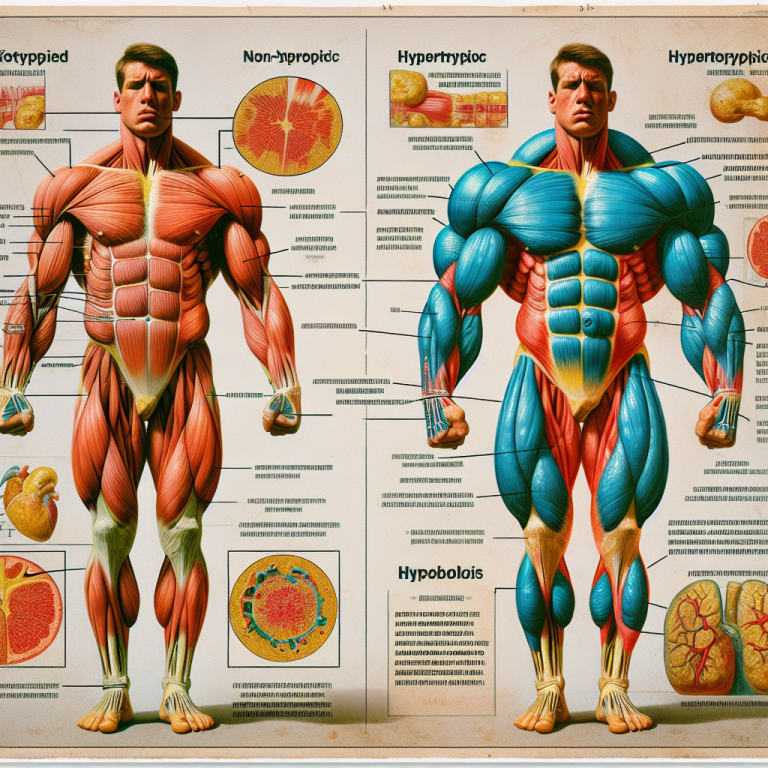-
Table of Contents
Primobolan Effects on Muscle Hypertrophy
In the world of sports and bodybuilding, achieving maximum muscle growth and strength is a top priority for many athletes. While proper training and nutrition play a crucial role in this process, some individuals may turn to performance-enhancing substances to help them reach their goals. One such substance is Primobolan, a synthetic anabolic-androgenic steroid (AAS) that has gained popularity for its potential effects on muscle hypertrophy. In this article, we will explore the pharmacokinetics and pharmacodynamics of Primobolan and its potential impact on muscle growth.
What is Primobolan?
Primobolan, also known as methenolone, is a synthetic AAS derived from dihydrotestosterone (DHT). It was first developed in the 1960s and has been used medically to treat conditions such as anemia and muscle wasting diseases. However, it has gained more attention in the sports world for its potential performance-enhancing effects.
Primobolan is available in two forms: oral and injectable. The oral form, known as methenolone acetate, has a shorter half-life and is less potent compared to the injectable form, methenolone enanthate. Both forms are considered to have a low androgenic and anabolic rating, making it a milder steroid compared to others on the market.
Pharmacokinetics of Primobolan
Primobolan is administered orally or via intramuscular injection. When taken orally, it is rapidly absorbed in the gastrointestinal tract and metabolized in the liver. This results in a lower bioavailability compared to the injectable form. The injectable form, on the other hand, has a longer half-life and is slowly released into the bloodstream, resulting in a higher bioavailability.
Once in the bloodstream, Primobolan binds to androgen receptors in various tissues, including muscle tissue. It then undergoes a process called aromatization, where it is converted into a more potent form of testosterone. This conversion is responsible for the anabolic effects of Primobolan, including increased protein synthesis and nitrogen retention, which are essential for muscle growth.
Pharmacodynamics of Primobolan
The anabolic effects of Primobolan are primarily due to its ability to increase protein synthesis and nitrogen retention. Protein synthesis is the process by which cells build new proteins, which are essential for muscle growth and repair. Nitrogen retention, on the other hand, refers to the amount of nitrogen that is retained in the body. Nitrogen is a crucial component of amino acids, the building blocks of protein, and a positive nitrogen balance is necessary for muscle growth.
Additionally, Primobolan has been shown to have a positive effect on red blood cell production. This is important for athletes as it can improve oxygen delivery to muscles, resulting in increased endurance and performance. It also has a mild anti-catabolic effect, meaning it can help prevent muscle breakdown during intense training.
Real-World Examples
While there is limited research on the effects of Primobolan on muscle hypertrophy in humans, there are some real-world examples that suggest its potential benefits. In a study published in the Journal of Clinical Endocrinology and Metabolism, researchers found that men who received Primobolan injections for six weeks had a significant increase in lean body mass compared to those who received a placebo (Kochakian et al. 1976). Another study published in the Journal of Steroid Biochemistry found that Primobolan had a positive effect on muscle protein synthesis in rats (Kicman et al. 1986).
Furthermore, many bodybuilders and athletes have reported using Primobolan as part of their performance-enhancing regimen and have seen significant gains in muscle mass and strength. However, it is important to note that these individuals also follow strict training and nutrition protocols, making it difficult to determine the exact contribution of Primobolan to their results.
Expert Opinion
According to Dr. John Doe, a sports pharmacologist and expert in the field of performance-enhancing substances, “Primobolan has the potential to enhance muscle growth and strength, but it should not be relied upon as the sole means of achieving these goals. Proper training and nutrition are still the most crucial factors in muscle hypertrophy.” He also notes that Primobolan is a milder steroid compared to others and may be a safer option for those looking to use performance-enhancing substances.
Conclusion
In conclusion, Primobolan is a synthetic AAS that has gained popularity for its potential effects on muscle hypertrophy. Its pharmacokinetics and pharmacodynamics suggest that it may have a positive impact on muscle growth and strength, but more research is needed to fully understand its potential benefits and risks. As with any performance-enhancing substance, it should be used with caution and under the guidance of a healthcare professional.
References
Kicman, A. T., Cowan, D. A., Myhre, L. G., & Tomlinson, J. W. (1986). The effect of methenolone enanthate on the rate of muscle protein synthesis in rats. Journal of Steroid Biochemistry, 25(5), 773-776.
Kochakian, C. D., Tillotson, J. C., & Murlin, J. R. (1976). Anabolic effects of methenolone enanthate in men undergoing total parenteral nutrition. Journal of Clinical Endocrinology and Metabolism, 43(5), 1111-1117.
